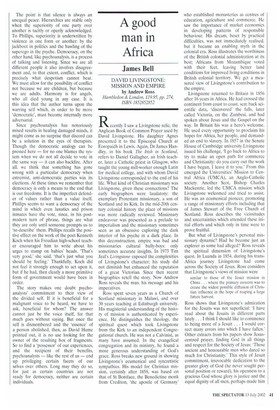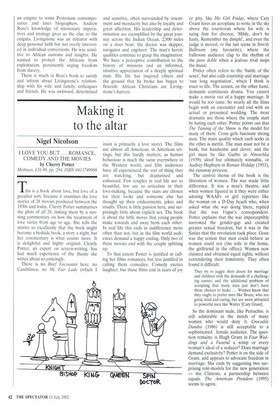A good man in Africa
James Bell
DAVID LIVINGSTONE: MISSION AND EMPIRE by Andrew Ross Hamblecion & London, £19.95, pp. 274, ISBN 1852852852 Recently I saw a Livingstone relic, the Anglican Book of Common Prayer used by David Livingstone. His daughter Agnes presented it to the Episcopal Church at Eoropaidh in Lewis. Again, Dr James Handley, in his book The Irish in Scotland, refers to Daniel Gallagher, an Irish teacher, later a Catholic priest in Glasgow, who taught the young mill-worker enough Latin for medical college, and with whom David Livingstone corresponded to the end of his life. What kind of Christian missionary was Livingstone, given these connections? The early biographers were laudatory: the exemplary Protestant missionary, a son of Scotland and its Kirk. In the mid-20th century colonial history the place of missions was more radically reviewed. Missionary endeavour was presented as a prelude to imperialism and the missionary sometimes seen as an obsessive exploring the dark interior of his psyche in a dark place. In this deconstruction, empire was bad and missionaries cultural bully-boys: only sometimes accurate insights. In 1973 Tim Jeal's Livingstone exposed the complexities of Livingstone's character; his study did not diminish but enhanced the reputation of a great Victorian. Since then recent biographies retell the story. Now Andrew Ross reveals the man, his message and his imperatives.
Ross spent seven years as a Church of Scotland missionary in Malawi, and over 30 years teaching at Edinburgh university. His magisterial understanding of the history of mission is authenticated by experience. He distinguishes the theology, the spiritual quest which took Livingstone from the Kirk to an independent Congregational church, He was not a Calvinist, as many have assumed. In the evangelical congregation and its ministry, he found a more generous understanding of God's grace. Ross breaks new ground in showing Livingstone's ecumenical and syncretistic sympathies. His model for Christian mission, certainly after 1858, was based on that of St Boniface, the Benedictine monk from Crediton, 'the apostle of Germany' who established monasteries as centres of education, agriculture and commerce. He saw the importance of market economics in developing patterns of responsible behaviour. His dream, beset by practical difficulties, was not immediately realised, but it became an enabling myth in the colonial era. Ross illustrates the worthiness of the British colonial administration at its best; Africans from Mozambique voted with their feet, leaving better land conditions for improved living conditions in British colonial territory. We get a measured view of Livingstone's contribution to the empire.
Livingstone returned to Britain in 1856 after 16 years in Africa. He had crossed the continent from coast to coast, sent back scientific data, 'discovered' the falls, later called Victoria, on the Zambesi, and had spoken about Jesus and the Gospel on the way. In Britain his was a hero's welcome. He used every opportunity to proclaim his hopes for Africa, her people, and demanded an end to slavery. In 1857 in the Senate House of Cambridge university Livingstone issued his challenge, 'I go back to Africa to try to make an open path for commerce and Christianity: do you carry out the work I have begun, I leave it to you.' From this emerged the Universities' Mission to Central Africa (UMCA), an Anglo-Catholic society. Another Scot, Bishop Charles Mackenzie, led the UMCA mission which Livingstone welcomed and tried to assist. He was an ecumenical pioneer, promoting a range of missionary efforts including that of James Stewart of the Free Church of Scotland. Ross describes the vicissitudes and uncertainties which attended these initial efforts and which only in time were to prove fruitful.
But what of Livingstone's personal missionary dynamic? Had he become just an explorer as some had alleged? Ross reveals the spiritual dimension of Livingstone's quest. In Luanda in 1854, during his transAfrica journey Livingstone had come across the Society of Jesus. Ross considers that Livingstone's views of mission were
similar to those of the Jesuit mission in
China . .. where the primary concern was to create the widest possible diffusion of Chris tian influence in the hope of reaping a large future harvest.
Ross shows that Livingstone's admiration for the Jesuits was not superficial: 'I have read about the Jesuits in different parts lately. I think I should like to commence to being more of a Jesuit . . I would correct many errors into which I have fallen.' Other extracts from his papers show Jesuscentred prayer. finding God in all things and respect for the Society of Jesus: 'Those ancient and honourable men who dared so much for Christianity.' This style of Jesuit commitment, irrevocable dedication to the greater glory of God (he never sought personal position or reward), his openness to a gracious God whose glory is justice and the equal dignity of all men, perhaps made him
an enigma to some Protestant contemporaries and later biographers. Andrew Ross's knowledge of missionary imperatives and strategy gives us the clue to the enigma. Livingstone was an initiator with deep personal faith but not overly interested in individual conversions. He was sensitive to African customs and insights. He wanted to protect the Africans from exploitation, persistently urging freedom from slavery.
There is much in Ross's book to satisfy and inform about Livingstone's relationship with his wife and family, colleagues and friends. He was awkward, determined and sensitive, often surrounded by resentment and mendacity but also by loyalty and great affection. His leadership and determination are exemplified by the great journey across the Indian Ocean, 2,500 miles on a river boat: the doctor was skipper, navigator and engineer. The man's heroic qualities continue to grasp the imagination. We have a perceptive contribution to the history of missions and an informed, intuitive appreciation of a deeply spiritual man. His life has inspired others and the ground that he broke has begun to flourish: African Christians are Livingstone's harvest.



































































 Previous page
Previous page